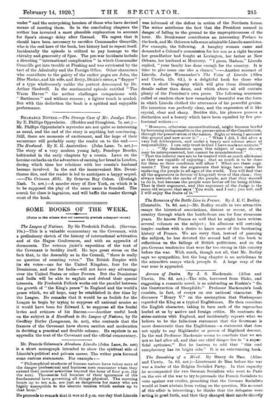Mr. Francis Grierson's Abraham Lincoln (John Lane, 5s. net) is
a short monograph intended to show the spiritual side of Lincoln's political and private career. The writer puts forward some curious statements. For example :- " Philosophical students of human nature have taken note of the danger professional and business men encounter when they extend their mental activities beyond the hour of four p.m. (by the sun). Thousands fail because of their ignorance of the fundamental laws governing all things physical. The morning hours up to ten a.m. are just as dangerous for many who are highly susceptible to the electric tension which odours up to that hoUr."
He proceeds to remark that it was at 6 p.m. one day that- Lincoln
was informed of the defeat in action of the Northern forces. The writer attributes the fact that the President seemed in danger• of falling to the ground to the =propitiousness of the hour. Mr. Drinkwater contributes an interesting Preface to the book, and Mr. Grierson tells some admirable Lincoln anecdotes. For example, the following. A haughty woman came and
demanded a Colonel's commission for her son as a right because her grandfather had fought at Lexington, her father at New Orleans, her husband at Monterey. " I guess, Madam," Lincoln replied, " your family has done enough for the country. It is time to give some one else a chance."—Another account of Lincoln, Judge Wanamaker's The Voice of Lincoln (Allen
and Unwin, 12s. 61), is a delightful book for those who want a short biography which will give them illuminating details rather than dates, and which above all will contain plenty of the President's own prose. The following sentences culled at random show how remarkably beautiful was the form in which Lincoln clothed the utterances of his powerful genius.
His intention was perfectly clear, and the expression of it like crystal, clear and sharp. Besides this, his phrases possess a distinction and a beauty which have been equalled by few pro- fessional writers :- " Measures, otherwise unconstitutional, might become lawful by becoming indispensable to the preservation of the Constitution, through the preservation of the nation. Right or wrong I assumed this ground and now avow it." . . . " What I did, I did after a very full deliberation, and under a heavy and solemn sense of responsibility. I can only trust in God I have made no mistake." . . . " My declaration upon this subject of negro slavery may be misrepresented, but cannot be misunderstood." . . . " That the inferior race are to be treated with as much allowance as they are capable of enjoying ; that as much is to be done for them as their condition will allow ? What- are these argu- ments ? They are the arguments that kings have made for enslaving the people in all ages of the world. You will find that all the arguments in favour of kingcraft were of this class ; they always bestrode the necks of the people, not that they wanted to do it, but because the people were better off for being ridden. That is their argument, and this argument of the Judge is the same old serpent that says ' You work. and I eat ; you toil, and I will enjoy the fruits of it.' "


































 Previous page
Previous page